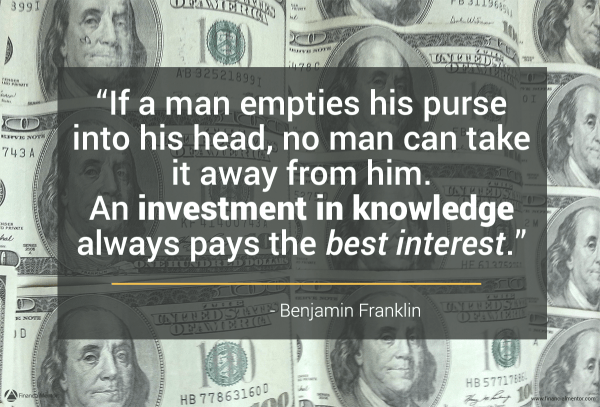Each person has a unique gift to bring to the world, and financial success results from an investment plan that capitalizes on that uniqueness. How you retire early and wealthy is going to be different from everyone else you talk to or associate with.That’s why prepackaged advice, investment seminars, and generic computer solutions that spew static financial “truths” can never measure up to personalized education that helps you find your own truth. Therefore, the second reason for the necessity of financial education is so that you can learn enough about yourself and the various investment strategies in existence to develop a wealth building solution custom fitted to your unique skills, values, and resources.
3. How to Overcome the Conflicts of Interest in Investment Advice
The only person 100% committed to your pocketbook is you. Everyone else has a conflict of interest. No less an authority than Alan Greenspan told Congress that:
“For an increasingly complex financial system to function effectively, widespread dissemination of timely financial and other relevant information among educated market participants is essential if they are to make the type of informed judgments that promote their own well-being.”
Greenspan also spoke about the need for Americans to better educate themselves about managing their finances and to promote greater financial education for children in the school system. Greenspan stated, “Financial literacy can help prevent younger people from making poor financial decisions that can take years to overcome.”
You are the only investment advisor for your portfolio that solely has your best interests at heart. Everyone else is in business to serve their best interests. Avoiding conflicts of interest by being skilled enough to sort investment fact from fiction is the third reason why financial education is necessary.
4. You can Delegate Authority, not Responsibility
Many people want to believe their advisors will take care of the big financial issues like retirement, college savings, and wealth planning for them. Just delegate the issues to a professional advisor, and don’t bother learning for yourself. Whether you hire financial experts or invest independently, you’re still responsible for your investment results. Each choice is a decision you make; therefore, you’re responsible.
You decide which investment expert to hire, and you decide which investment to buy. If you don’t like your investment results, there is no one except you to blame. You can’t delegate the responsibility, even if you delegate the authority. The only way to make consistently smart investment decisions is if you learn what works, what doesn’t, and why.
If your investment decisions aren’t based on knowledge, then what are they based on – salesman’s charisma, speaker’s charm, media sound-bites, trust, or blind faith? None of these are a reliable prescription for investor success.
Related: Why you need a wealth plan, not an investment plan.
It’s incongruous to own self-responsibility in your mind for your financial future, yet not take action by educating yourself on how to make smart investment decisions. Anything less is irresponsible. Prioritizing your financial education is how you become self-responsible for your financial future. It’s the fourth reason financial education is necessary.
5. Your Financial Intelligence Compounds Like Money
It’s critically important that your financial intelligence grow at least as fast as your portfolio. Why? Because there is nothing more financially dangerous than a million dollars worth of investment decisions being made with a thousand dollars worth of financial intelligence.
“Perhaps the most valuable result of all education is the ability to make yourself do the thing you have to do, when it ought to be done, whether you like it or not; it is the first lesson that ought to be learned; and however early a man’s training begins, it is probably the last lesson that he learns thoroughly.” – Thomas H. Huxley
Your financial intelligence acts as a ceiling that limits the growth of your wealth. As you raise your financial intelligence, you raise the ceiling on what’s financially possible for you. Your financial intelligence sets the context for your investment success – or lack thereof. Your return on investment should improve as you learn how to invest more consistently and control losses when the inevitable mistakes occur. That translates into more dollars in your pocket and greater financial security.
![]() A little known fact about financial intelligence is it grows and compounds just like money. The effect is multiplicative – not additive. Each new tidbit of information connects to all the other knowledge which multiplies. It doesn’t just add up, but it grows geometrically by multiplying. Your goal should be to make regular deposits every week into your financial intelligence account, just like you make monthly deposits into your investment accounts. When you do this, your financial intelligence will multiply and grow ahead of the growth in your investment accounts to help create a lifetime of financial security.
A little known fact about financial intelligence is it grows and compounds just like money. The effect is multiplicative – not additive. Each new tidbit of information connects to all the other knowledge which multiplies. It doesn’t just add up, but it grows geometrically by multiplying. Your goal should be to make regular deposits every week into your financial intelligence account, just like you make monthly deposits into your investment accounts. When you do this, your financial intelligence will multiply and grow ahead of the growth in your investment accounts to help create a lifetime of financial security.
6. Financial Intelligence is the Single Investment you Never Lose

Financial education is like an annuity. It’s a one-time investment that pays dividends for the rest of your life. People can steal your money, but no one can ever take your financial education from you.
7. True Freedom and Independence Requires Financial Intelligence
Needing others to make financial decisions for you is dependence.Regardless of the amount of money you have, you’ll never be financially independent or secure as long as you depend on someone else to manage your money.
You can’t experience true freedom if you’re dependent on someone else’s experience and knowledge for your financial well-being. The world is littered with people who built vast fortunes and lost it all because of their own financial ignorance. Lacking financial intelligence is the opposite of financial security – no matter how much money you have.
Choosing the path of financial intelligence, where you learn to make decisions independent of other people’s advice, leads to investment wisdom. This allows you to independently sort all the divergent opinions with confidence and decide what’s uniquely true for you and your portfolio.
The alternative is to remain permanently dependent on all the conflicting and confusing opinions offered up as expertise by others, and play a guessing game as to what’s true for you. Financial education teaches you how to fish so that you never have to be dependent on another person to give you a fish again. Financial education teaches financial independence.
If you want to learn more about how to manage your finances, in particular your ETF portfolio, consider signing up for the ETF Trends Virtual Summit, March 14th.
This article was republished with permission from Financial Mentor.
